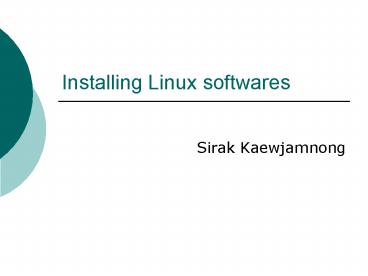Installing Linux softwares - PowerPoint PPT Presentation
1 / 16
Title:
Installing Linux softwares
Description:
Installing Linux softwares. Sirak Kaewjamnong. 2. Software packets. When Linux developers create their software they typically bundle all the ... – PowerPoint PPT presentation
Number of Views:71
Avg rating:3.0/5.0
Title: Installing Linux softwares
1
Installing Linux softwares
- Sirak Kaewjamnong
2
Software packets
- When Linux developers create their software they
typically bundle all the executable and data
files into a single file called a "package" file.
- Package files have different formats and contain
different control files - Where the rest of the files should be placed
- The permissions they should have
- A list of prerequisite packages that are required
for the package to function correctly
3
Packet file types
- Redhat, and Fedora Linux software is primarily
available in RedHat Package Manager (RPM) files - Debian and Ubuntu Linux use the Debian Package
format in which the filenames end with ".deb
called DEB files - Software developers who want to use a universally
recognizable file format across all flavors of
Linux also will make their products available as
TAR packages
4
Where to get used Packages
- Packages on Linux Installation CDs
- Manually Downloaded Packages
- two most common ways of getting packages are by
manually using FTP or a Web browser
5
Popular Package Download Sites
- Redhat
- http//www.redhat.com/
- http//www.rpmfind.net/
- Fedora
- ftp//download.fedora.redhat.com/pub/fedora/linux/
core/ - http//download.fedora.redhat.com/pub/fedora/linux
/core/ - http//www.rpmfind.net/
6
Popular Package Download Sites
- Debain
- http//packages.debian.org
- Ubuntu
- http//packages.ubuntu.com
7
How to Download Software
- Getting Software Using Web-Based FTP
- Browse the desired Web site until you find the
link to the software package. - Click on the link for the desired software
package. - Save the file to hard drive
- Getting RPMs Using Command-Line Anonymous FTP
8
FTP Commands
- Command Description
- binary Copy files in binary mode
- cd Change directory on the FTP server
- dir List the names of the files in the current
remote directory - exit Bye bye
- get Get a file from the FTP server
- lcd Change the directory on the local machine
- ls Same as dir
- mget Same as get, but you can use wildcards like
"" - mput Same as put, but you can use wildcards like
"" - passive Make the file transfer passive mode
- put Put a file from the local machine onto the
FTP server - pwd Give the directory name on the local machine
9
How to Download Software
- Getting software using wget
- The wget command can be used to download files
quickly when you already know the URL at which
the RPM is locate - wget http//linux.stanford.edu/pub//i386/RPMS/dh
cp-3.0pl2-6.16.i386.rpm
10
Installing Software From RPM Files
- There are generally two ways to install RPM files
manually. - using a file previously downloaded to your hard
drive - install the RPM from some sort of removable media
such as a CD-ROM drive - Use command rpm to install .rpm file
11
The RPM Command
- rpm -Uvh is the command to install package
- -U qualifier is used for updating an RPM to the
latest version - -h qualifier gives a list of hash characters
during the installation - -v qualifier prints verbose status messages while
the command is run
12
RPM command example
root_at_bigboy tmp rpm -Uvh mysql-server-3.23.58-9
.i386.rpm Preparing...
100 1mysql-server
100 root_at_bigboy tmp
13
RPM Installation Errors
- Sometimes RPM installations will fail giving
Failed dependencies errors which really mean that
a prerequisite RPM needs to be installed - To get around this problem by run the rpm command
with the --nodeps option to disable dependency
checks
root_at_bigboy tmp rpm -Uvh --nodeps
mysql-3.23.58-9.i386.rpm
14
Uninstalling RPMs
- The rpm -e command will erase an installed package
root_at_bigboy tmp rpm -e package-name
15
Automatic Updates with yum
- The yum automatic RPM update program comes as a
standard feature of Fedora Core. It has a number
of valuable features - You can configure the URLs of download sites you
want to use. This provides the added advantage of
you choosing the most reliable sites in your part
of the globe. - yum makes multiple attempts to download RPMs
before failing. - yum automatically figures out not only the RPMs
packages that need updating, but also all the
supporting RPMs. It then installs them all.
16
Installing Software From DEB Files
- Unlike Redhat or Frdora,the Debian and Ubuntu
versions of Linux rely on packages in the DEB
format - Use dpkg --install command to install the .deb
package
root_at_u-bigboy dpkg --install
ndiswrapper-utils_1.8-0ubuntu2_i386.deb
Selecting previously deselected package
ndiswrapper-utils. (Reading database ... 70221
files and directories currently
installed.) Unpacking ndiswrapper-utils (from
ndiswrapper-utils_1.8-0ubuntu2_i386.deb)
... Setting up ndiswrapper-utils (1.8-0ubuntu2)
... root_at_u-bigboy































